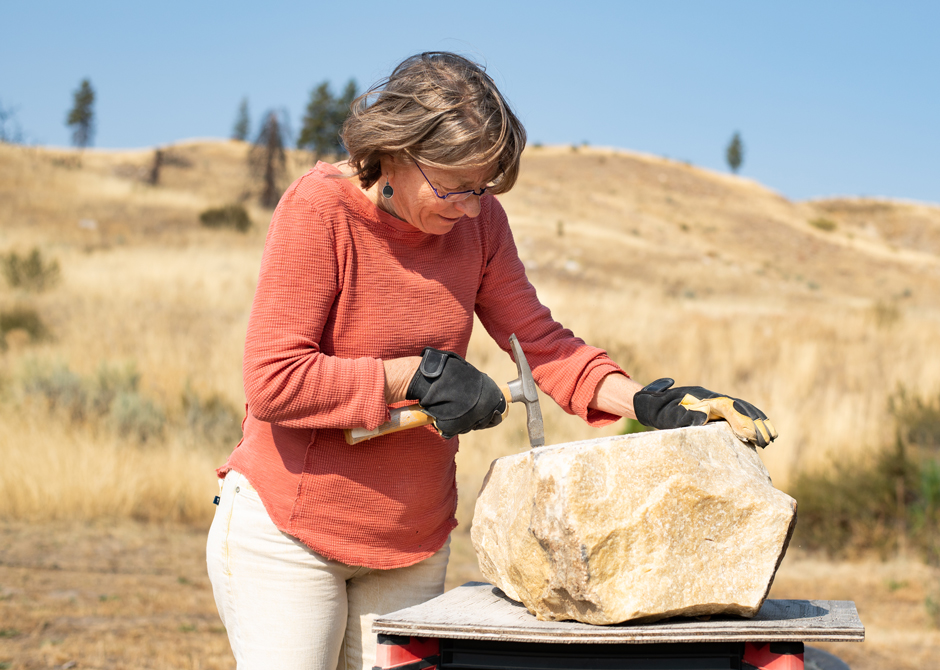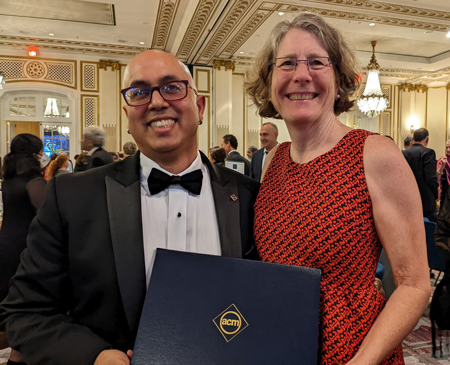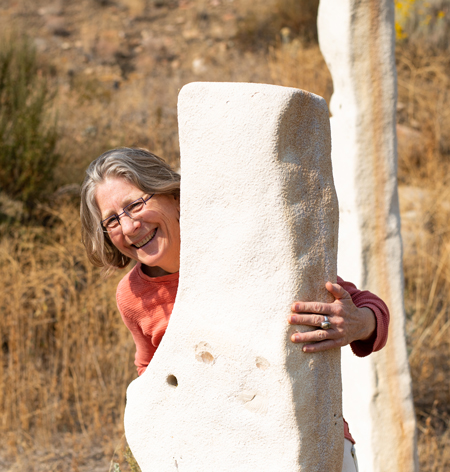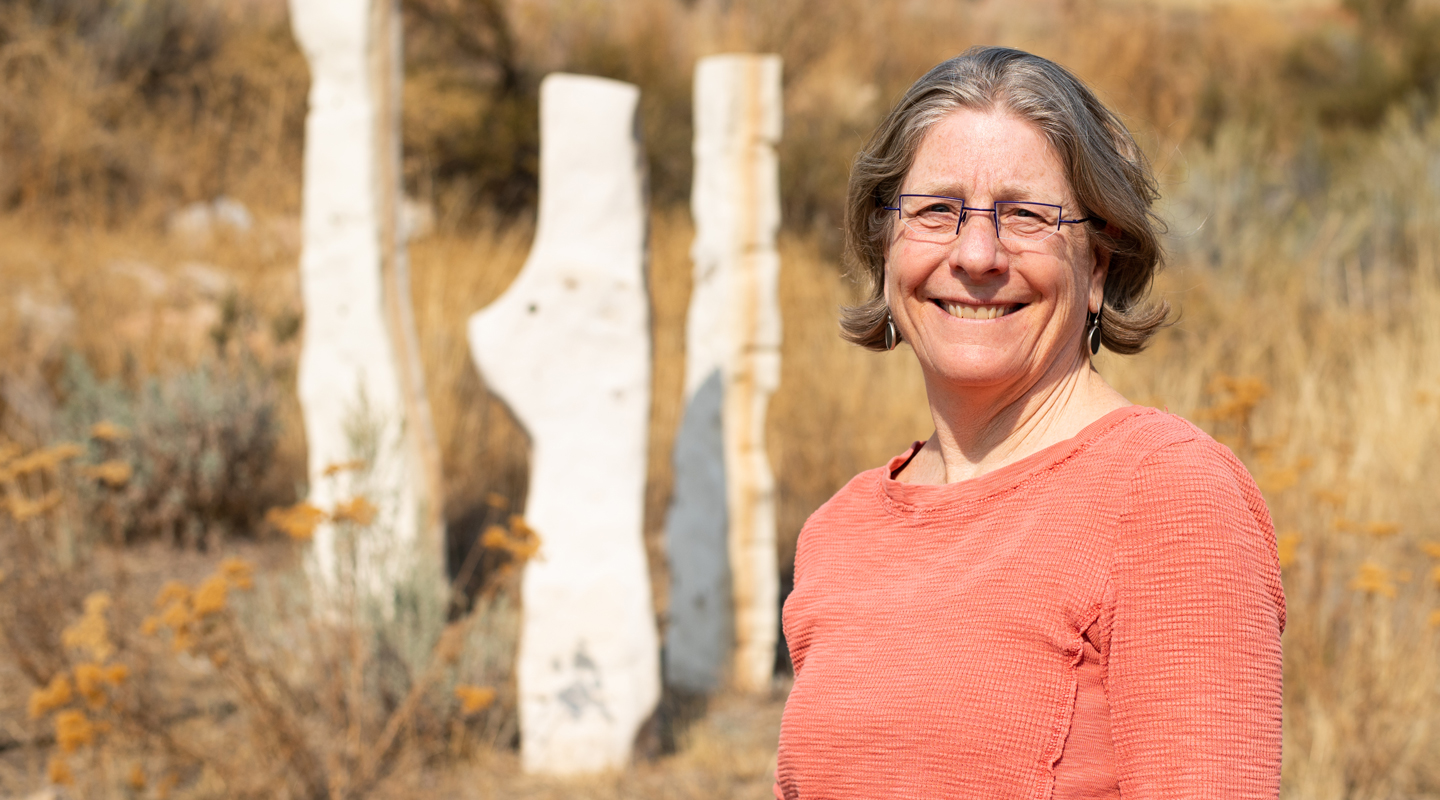Batya Friedman taps away at a rock on a remote hillside east of the Cascades. With each strike of her hammer, she brings out the beauty she sees within the stone and transforms a small piece of this landscape of jagged peaks.
Friedman’s approach to stone carving is a lot like her groundbreaking work in technology design: methodical, thoughtful, and inspired by her desire to make the world a little better.
It’s an approach that’s made the longtime professor an influential international researcher and a key figure in the growth of the University of Washington Information School. While much of the tech industry privileges speed and profit, Friedman takes a big-picture, longer-term view of technology: Does it make life better for people, now and in the future? Does it account for human values? Is it something we even need in the first place?
Hers was once a lonely voice asking such questions. Now, as she takes a step back into semi-retirement from her academic career, those topics are foremost in the minds of scholars, technologists and policymakers.
“We’re fast and furious with these technologies that are at a scale and power that’s beyond our current moral capacities,” Friedman says. “I think right now we have a really great mismatch between the power of our tools and our wisdom to use them well.”
In the 1990s, Friedman developed Value Sensitive Design, an approach that makes human values central to the design of new technologies. Rather than focusing on a narrow set of concerns such as efficiency and productivity, Value Sensitive Design requires designers to think about technology’s broader effects on individuals, groups and society.
Value Sensitive Design has been widely adopted in fields including architecture, civil engineering, computer security, energy, global health, tech policy, transportation and urban planning. It’s a holistic approach, acknowledging that technology reflects the values of those who create it, and asserting that technology should support people’s dignity, respect, autonomy, agency and other enduring values.
“Human values don’t exist in isolation,” Friedman says. “It’s not like there’s privacy over here, and trust over there, and security there.”
* * *

It was very different when Friedman was typically one of a few women in her engineering classes of about 100 students at the University of California, Berkeley, in the 1970s. Computing was increasingly becoming part of the workplace, but wasn’t yet part of everyday life for most people. The focus then was on expanding the limits of technology, with little thought devoted to its implications on human flourishing, on society, or on the planet writ large.
Terry Winograd, a professor at Stanford University and a leader in the field of human-computer interaction, first encountered Friedman more than 40 years ago and became a longtime mentor and colleague. He remembers a young researcher who asked questions about the emerging field that few others were asking.
“She always had a sense of the people involved, not just the things involved,” he says. “She was very interested in the questions of computing ethics and social issues in a way which was much more unusual back then.”
After earning her Ph.D. at Cal-Berkeley and making a stop at Mills College in Oakland, California, Friedman joined the faculty at Colby College, a small liberal arts school in Maine. She was the first faculty hire in computing at Colby, where she built a humanistic undergraduate major in computer science over a period of 10 years.
At Colby, she enjoyed the intellectual freedom to dig deeply into her interest in the intersection of computing practice, technical design and human values. Few researchers were doing the kind of work that intrigued her.
“At the time, if you did any search on values and computing or anything related to that, you would come up with nothing. It just was not on people’s radars,” Friedman says.
“I wanted to do my work from within computing. I wanted to do it as an insider, not as an outside critic, to provide leadership for the field."
She saw an opportunity for the field to change. She began looking for theoretical insights and research methods that would give her greater confidence that the technologies she built would enrich people’s lives — protect their privacy, mitigate injustice, and lead to deeper, trusted relationships. As she built information systems, she wanted to engage with the insights of sociologists and applied moral philosophers.
“I wanted to do my work from within computing,” she says. “I wanted to do it as an insider, not as an outside critic, to provide leadership for the field. Transformation can be more compelling when you can say ‘we.’”
It was at Colby that she first developed Value Sensitive Design, which over time has emerged as a widely used approach to addressing computing ethics and responsible innovation in higher education, government and industry. When she joined the UW in 1999 and Michael Eisenberg, who was establishing the iSchool, charged her with developing the Informatics major, she imbued it with the humanistic view of computing that she had been developing in Maine.
At the UW, Friedman continued to develop Value Sensitive Design theory and methods, first with Alan Borning, now a professor emeritus at the Allen School of Computer Science & Engineering. Borning shared lab space with Friedman when she first arrived and became a friend and colleague for the rest of her career.
A short time later, she began working with iSchool Associate Professor David Hendry, her collaborator for more than 15 years. The two run the iSchool’s Value Sensitive Design Lab and co-authored a book released in 2019, Value Sensitive Design: Shaping Technology with Moral Imagination, that distills their work and explains their approach for considering human values as well as the long-term effects of technology in a technical design process.
Friedman and Hendry have prioritized depth over speed, being selective about their projects and waiting to publish results once they were robust. As a result, they’ve built a reputation for rigorous research, and other scholars and practitioners were able to use their methods with confidence.
“It helps you to conduct research in a way that has a lot of integrity,” Hendry says. “You’ve iterated over and over again and you’ve found where the holes or limitations are. That just takes time.”
* * *

That same ethic animates the UW Tech Policy Lab, a collaboration among the iSchool, the School of Law and the Allen School of Computer Science & Engineering. Co-directed by Friedman and Professors Ryan Calo and Tadayoshi Kohno, the Tech Policy Lab seeks to support policymakers so they will make wiser, more inclusive decisions around technology.
“Some of the influence of Batya on the lab can be felt in the idea that we don’t try to take on everything,” says Calo, who has a joint appointment with the iSchool and the law school. “We just try to ask ourselves what we can really do well. What can we do rigorously? What can we do that other places maybe can’t?”
One such project was a deck of cards, designed for students and technologists, for brainstorming ideas about security and privacy risks that might emerge with a new technology.
“I think it was pretty visionary,” says Kohno, a professor in the Allen School who collaborated with Friedman and Ph.D. student Tamera Denning on the project in the early 2010s. “One of the things I loved about this effort was the breadth of issues that we covered. Whereas traditional computer security might focus on things like financial harms, with the security cards we focus on a broad spectrum of issues, including, for example, risks to the biosphere.”
More recently, the Tech Policy Lab studied how farmers in Eastern Washington live and work with technology. Amid the onset of the COVID-19 pandemic, the researchers wanted to understand threats to food supply systems so they could make policy recommendations to mitigate the potential weak points.
Dubbed the Food Resiliency Project, it studied one region as a microcosm of the nation’s small farming communities. iSchool Ph.D. students Nick Logler, Stephanie Ballard, Elias Greendorfer and Ishita Chordia worked with Friedman on the project. It resulted in a set of policy recommendations to help support civic agriculture, a trend in farming to move away from the industrialized sector and into more localized community efforts to foster sustainable local economies.
Hendry says the project was an example of how Friedman works and thinks creatively. She looked in-depth at how people live with technology, then extrapolated from that to think of ways to improve conditions more broadly.
“Batya is a very deep and abstract thinker, and she’s also entirely practical at the same time,” he says. “The thing she demonstrates better than anyone I know is just how optimistic she is about finding solutions to practical challenges that we have.”
* * *
One example of Friedman’s creativity was one of the most challenging and memorable projects of her career. For “Voices from the Rwanda Tribunal,” she built an archive of interviews documenting the work of the international criminal tribunal that investigated the 1994 Rwandan genocide. The tribunal was finishing its work when Friedman led a team of researchers and videographers that traveled to Africa to collect and preserve the stories of the judges, prosecutors, investigators and others who were involved.
The stories were often moving and horrifying, but to those who participated in the tribunal, it was important for Rwanda’s future citizens and for the rest of the world to know what they experienced. Friedman collected the videos in an open-source archive, with the hope that they will continue to be shared for generations.
The project helped shape Friedman’s thinking about what she calls multi-lifespan design — the idea that some work unfolds over decades and that information systems need to account for ideas that develop over a long period of time.
“Maybe there are things in 20 or 50 years that you’re going to want to know about the present, so you need to collect them now,” she says. “The people who start the work are not going to be the people who finish the work.”
"She’s brought in a lot of money, a lot of grants, and written many papers and books, but the rigor of her work is really outstanding.”
Ph.D. students including Logler, Lisa Nathan and Daisy Yoo are among those who worked on the project, which spanned a decade. Like that project, Nathan’s current research on climate justice requires long-term, multi-lifespan thinking.
Nathan, ’09, says her work carries forward Friedman’s interest in humanistic questions as well as her demand that research have depth and be able to stand up to scrutiny.
“The rigor of her thinking, and her expectations, and the kind of thinking she really wants people to engage in — that inspired the heck out of me,” Nathan says. “Those are the things that really stand out to me. She’s brought in a lot of money, a lot of grants, and written many papers and books, but the rigor of her work is really outstanding.”
The demand for thoroughness and precision is also something that has stuck with Friedman’s first Ph.D. student, Nathan Freier, ’07, who describes Friedman as “one of the most thoughtful and diligent people I’ve ever met.”
He now works as a responsible technology lead at Microsoft, working to deliver the Office product group’s technology responsibly and safely. He relies on the framework Friedman built for Value Sensitive Design as he works on products and considers their practical and ethical implications.
“The notion of privacy, informed consent, psychological safety, human flourishing — all these concepts that Batya integrated into her research and that she used to drive forward that body of work are things that I often rely on, in terms of how we approach responsible technology at Microsoft,” Freier says.
* * *

Friedman can look around and see plenty of signs of her impact on the iSchool, on the field of information science, and beyond. Value Sensitive Design principles are embedded across industry. The Informatics program she designed has grown into one of the most sought-after majors at the UW. The doctoral students she has mentored are carrying on her work at places such as Georgia Tech and Eindhoven University of Technology.
“I feel a great sense of satisfaction,” she says. “Others are taking these ideas, theoretical constructs, methods, and practices — applying and extending them in their own ways and own contexts. And that’s when you know you’ve contributed to shifts in the world.”
Over the next couple years, Friedman intends to finish her current projects with the Tech Policy Lab and resist taking on new ones. For the past 15 years, she has devoted her spare time to art, and now she will be able to make that her focus. She’s designing a studio for her stone carving, painting and mixed-media work.
Whether she’s devoting her time to her scholarship or to her art, the goal is the same.
“My scholarly and technical work is about creating the conditions to make the world a better place — a place for human flourishing and for a flourishing planet,” she says. “My art is about beauty and form — in effect, creating the peace that I hope we will all experience when we arrive there.”
